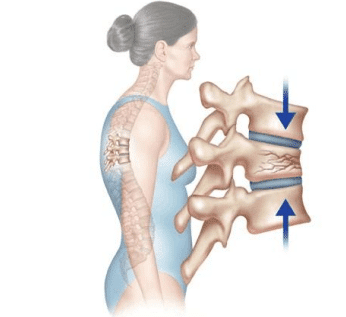
Spinal Compression Fracture Treatment – Is surgery needed?
Spinal Compression Fractures are common and the incidence increases with age. They can
happen with a fall, or age and gender related conditions such as osteoporosis. Often
under-diagnosed and under-treated, Spinal Compression Fracture can benefit from
conservative Physiotherapy treatment.
Read on to find out more about Spinal Compression Fractures, Symptoms, Diagnosis,
Physiotherapy Management and Exercises that can be done to ease pain and stiffness.
Understanding Spinal Compression Fracture (Wedge fracture)
Spinal Compression Fracture occurs because of compression of the bone in the spine. Most
compression fractures happen in vertebra that have been weakened by osteoporosis or other
diseases that weaken bone, such as cancer. The fracture occurs when the bone has
deteriorated to the point that it can no longer support the spinal column in daily activities. While
compression fractures can happen anywhere in the spine, they typically occur in the thoracic
region (mid back) or the lumbar spine (lower back). It can occur in one or more vertebrae at the
same time.
Symptoms of Spinal Compression Fracture:
● Severe acute back pain worsens with twisting or bending
● Loss of height
● Hunched forward posture (kyphosis)
● In more severe cases, the fracture may cause nerve symptoms including numbness,
tingling, muscle spasms, weakness, bowel/bladder problems or even paralysis.
Diagnosing Spinal Compression Fracture

Vertebral fractures are diagnosed by an X-ray in the respective location of the spine. Following
the X-ray your spinal specialist will generally order a CT scan which is an effective way to
visualize any changes in the bony structure. A MRI may also be ordered to evaluate the
surrounding soft tissues, ligaments, intervertebral discs, or to identify any spinal cord injury.
Treatment Options:
Compression spinal fractures are typically treated with a conservative approach which involves
immobilization using a back brace, brief bed rest, pain medications as necessary and hot or cold
therapy for pain management.
However, when symptoms are severe and affect mobility, home rehabilitation can be considered
to ease off the symptoms. If the compression is significant or an unstable spinal fracture
develops, surgery may be indicated in order to stabilize the fracture, remove any nerve
compression and assist with healing. This is where orthopaedic rehabilitation comes into play.
How can Physiotherapy help with Spinal Compression Fracture pain?
While the fracture is healing, Physiotherapy Services including musculoskeletal pain treatment
helps patients to manage pain and minimize disability with a hopeful return to their functional
level before the injury.
Evidence shows that pain management techniques in the acute phase of vertebral fracture is
beneficial. They include ultrasound, ice, heat, early mobilization, stretching exercises to
decrease muscle spasm, and a gentle strengthening exercise program depending on the
severity and level of instability of the fracture.
Gait training and fall prevention programmes that include proprioception, posture and balance
exercises can greatly benefit you to decrease both pain and subsequent fracture risk due to
falls. Avoid activities that may put you at risk for more vertebral fractures, which include forward
bending, exercising with trunk in flexion, twisting, sudden, abrupt movements, jumping, and
jarring movements, high-intensity exercise, and heavy weight-lifting.
Exercises Safe for Stable Spinal Compression Fractures
- pelvic titls (3 sets of 10 reps)
2. knee to chest (3 sets of 10 reps)
3. Bridging (3 sets of 10 reps)
4. Shoulder squeezes/Scapular retraction (3 sets of 10 reps)
Recognizing a Spinal Compression Fracture in the early stage can help to reduce the risk of fall
and prevent future fractures. Once diagnosed for conservative management, patients should
receive effective management through Physical Therapy.
In Rapid Physiocare (Physiotherapy Singapore), Our Physiotherapists are experienced to treat
your pain and ready to help you get back into your active lifestyle! If you experience any
symptoms mentioned above, get in touch with us through our website
www.rapidphysiocare.com or call +65 6904 4900.



